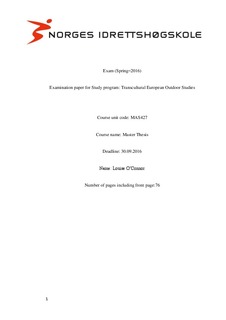A jigsaw of wellbeing: exploring the practitioner’s perspective on the impact of Brathay Trust’s residential programmes on young people’s wellbeing
Master thesis
Permanent lenke
http://hdl.handle.net/11250/2434234Utgivelsesdato
2016Metadata
Vis full innførselSamlinger
Sammendrag
Wellbeing is a topic which has become increasing prevalent in government agendas in the UK and internationally. Youth wellbeing in particular has become of critical concern as the effects of global and national economic and social instability have negatively impacted young people’s wellbeing. The term wellbeing can be difficult to define and integrates many topics including economics, sociology, politics and psychology. Research indicates that especially in the case of ‘at risk’ young people, structural factors must be also taken into account, as well as individual, agentic factors which influence their wellbeing. Research has shown that outdoor based programmes can have a positive impact on young people’s wellbeing on a number of levels. Brathay Trust is a youth development charity which delivers community based and outdoor based residential programmes predominantly to young people from socially disadvantaged backgrounds. One of the four strands of Brathay’s work has the focus of enhancing the wellbeing of young people with discrete needs. The present study examines the practitioner’s’ perspective on how residential programmes at Brathay contribute to young people’s wellbeing. Wilber’s (1997) Integral framework was employed as a tool for framing the concept of wellbeing throughout the current study.
Beskrivelse
Masteroppgave - Norges idrettshøgskole, 2016
